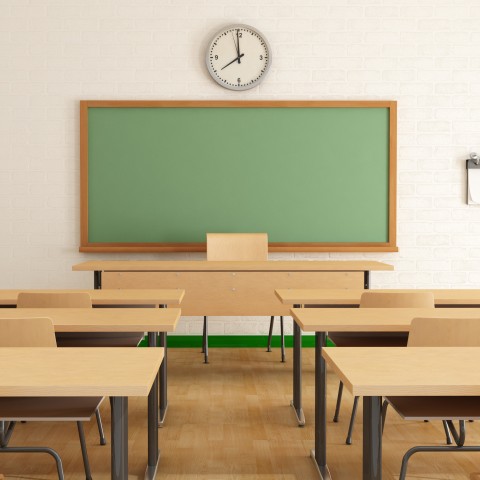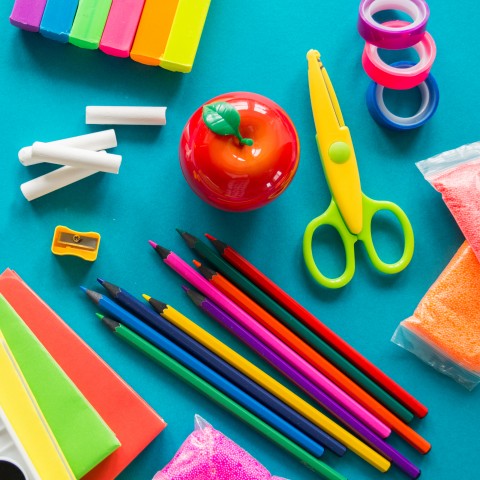
Imagine you are sitting in a Chinese classroom with Chinese students at a Chinese high school. Would you be able to use proper classroom greetings to greet your teacher and classmates in Mandarin Chinese? Would you be able to understand your Chinese teacher’s classroom command phrases? Would you have enough Chinese classroom vocabulary words and phrases to communicate with classmates and teachers? Would you have confidence in your Chinese grammar skills to produce phrases and express yourself accurately and freely?
If any of your answers are “no,” you’ve come to the right place! In this article, you will learn all about Chinese classroom phrases and school-related basic Chinese words and phrases. Our goal is to make your Chinese language learning easy, fun, and meaningful!

No time to read the whole article? No problem. Check out our Back to School cheat sheet for Chinese basic phrases and vocabulary with a school and classroom theme for a quick reference!
 Table of Contents
Table of Contents
- Use Classroom Greetings
- Understand Instructions from Teachers
- Comments and Feedback
- Ask Questions to Teachers and Classmates
- Talk about Favorite Subjects
- Check for School Supplies
- Last But Not Least
1. Use Classroom Greetings
1 – Formal Greetings in a Classroom
Traditionally in Chinese primary schools and secondary schools, students and teachers greet each other formally at the beginning and end of a class. As soon as the teacher enters the classroom, a student whose role is 班长 (bānzhǎng) “class leader” orders the whole class to stand up and greet the teacher in chorus. Although it might not be this formal in your Mandarin Chinese class, it’s good to know what these phrases mean!
Usually, the greetings at the beginning of the class go in the order below:
- ➢ 老师: 上课!Lǎoshī: Shàngkè!
“Teacher: Class begins!”
- 班长:起立!Bānzhǎng: Qǐlì!
“Class leader: Stand up!”
- ➢ 老师:同学们好!Lǎoshī: Tóngxuémen hǎo!
“Teacher: Hello, students!”
- 全班同学:老师好!Quán bān tóngxué: Lǎoshī hǎo!
“Whole class: Hello, teacher! ”
At the end of a class, the greetings are similar:
- ➢ 老师: 下课!
Lǎoshī: Xiàkè!
“Teacher: Class ends!”
- 班长:起立!Bānzhǎng: Qǐlì!“Class leader: Stand up!”
- ➢ 老师:同学们再见!Lǎoshī: Tóngxuémen zàijiàn!
“Teacher: Goodbye, students!”
- 全班同学:老师再见!Quán bān tóngxué: Lǎoshī zàijiàn!
“Whole class: Goodbye, teacher! “
Note: in this article
➢ marks teacher phrases
• marks student phrases
2 – Informal Greetings on Campus
Nowadays, more and more schools choose not to adopt the rigid formal classroom greetings shown above. Instead, the teacher gets right to teaching without greetings or very informal greetings. However, outside a classroom on the school campus, students are still expected to greet their teachers to show respect. When it comes to students greeting each other, it gets casual.
Here are some scenarios of informal greetings between a student and a teacher, and between two students.
Scenario #1: 夏雨 (Xià Yǔ) “Yu Xia,” a student sees his teacher 刘老师 (Liú lǎoshī) “Teacher Liu” in the hallway before the first bell rings.
- 夏雨: 刘老师好!Xià Yǔ: Liú lǎoshī hǎo!
“Yu Xia: Hello, Mr. Liu.”
- ➢ 刘老师: 早!Liú lǎoshī: Zǎo!
“Teacher Liu: Morning!”
Scenario #2: 夏雨 (Xià Yǔ) Yu Xia sees his teacher 刘老师 (Liú lǎoshī) Mr. Liu while waiting on the bus to go home.
- 夏雨: 刘老师再见!Xià Yǔ: Xú lǎoshī zàijiàn!
“Yu Xia: Goodbye, Mr. Liu”
- ➢ 刘老师: 再见!Liú lǎoshī: Zàijiàn!
“Teacher Liu: Goodbye!”
Scenario #3: 夏雨 (Xià Yǔ) “Yu Xia” walks in the classroom while her friend and classmate 王明一 (Wáng Míngyī) “Mingyi Wang” is finishing up his homework.

- 夏雨: 早啊!赶作业呢?Xià Yǔ: Zǎo a! Gǎn zuòyè ne?
“Yu Xia: Morning! Still working on your homework?”
- 王明一: 嗯。还有一页。Wáng Míngyī: En. Háiyǒu yí yè.
“Mingyi Wang: Yeah. One more page to go.”
Scenario #4: 夏雨 (Xià Yǔ) “Yu Xia” says goodbye to 王明一 (Wáng Míngyī) “Mingyi Wang” as she gets off the bus.
- 夏雨: 我走了。明天见。Xià yǔ: Wǒ zǒule. Míngtiān jiàn.
“Yu Xia: I’m leaving now. See you tomorrow.”
- 王明一: 拜拜!Wáng Míngyī: Báibái!
“Mingyi Wang: Byebye!”
- ❖ Linguistic Iinsight
| Keyword | Usage | Examples | |
| Greetings | 好 (hǎo) “good” | Time + 好 (hǎo) Title + 好 (hǎo) | 早上好。Zǎoshang hǎo. “Good morning.” (lit. “Morning good.”) 老师好。Lǎoshī hǎo. “Hello, teacher.” (lit. “Teacher good.”) |
| Parting Expressions | 见 (jiàn) “to see” | Time + 见 (jiàn) Place + 见 (jiàn) | 明天见。Míngtiān jiàn. “See you tomorrow. “学校见。Xuéxiào jiàn. “See you at school.” |
2. Understand Instructions from Teachers
Teachers play a key role in learning. Knowledge and skills are delivered by teachers through their instructions. There is nothing more important than understanding the teacher and following his or her instructions. In this section, we’ll take a close look at command phrases teachers are most likely to use in a class.

1 – Instructions and Commands
- ➢ 请拿出课本。Qǐng ná chū kèběn.
“Please take out your textbook.”
- ➢ 请翻到第五十页。Qǐng fān dào dì wǔshí yè.
“Please turn to page fifty. “
- ➢ 请看黑板。Qǐng kàn hēibǎn.
“Please look at the blackboard.”
- ➢ 请跟我读。Qǐng gēn wǒ dú.
“Please read after me.”
- ➢ 请仔细听。Qǐng zǐxì tīng.
“Please listen carefully.”
- ➢ 不要说话。Búyào shuōhuà.
“Do not talk.”
- ➢ 举手回答。Jǔ shǒu huídá.
“Raise your hand to answer (the question).”
- ➢ 小组讨论一下。Xiǎozǔ tǎolùn yíxià.
“Discuss within your group.”
- ➢ 把作业交上来。Bǎ zuòyè jiāo shànglái.
“Hand in your homework.”
- ❖ Cultural note: 请 (qǐng) makes a polite command. But since teachers are higher on the social hierarchy, they don’t always use 请 (qǐng) with their students.
2 – Questions and Check-ins
- ➢ 懂了吗?Dǒngle ma?
“Understand now?”
- ➢ 听明白了吗?Tīng míngbái le ma?
“Did you understand what I said?”
- ➢ 有没有问题?Yǒu méiyǒu wèntí?
“Questions? “
- ➢ 你同意吗?Nǐ tóngyì ma?
“Do you agree?”
- ➢ 确定吗?Quèdìng ma?
“Are you sure?”
- ➢ 谁想来试试?Shéi xiǎnglái shì shi?
“Who wants to give it a try?”
3 – Comments and Feedback
- ➢ 不错。Búcuò.
“Not bad.”
- ➢ 非常好。Fēicháng hǎo.
“Excellent.”
- ➢ 很棒。Hěn bàng.
“Great.”
- ➢ 很有新意。Hěn yǒu xīnyì.
“Very creative.”
- ➢ 不完全对。Bù wánquán duì.
“Not entirely true.”
- ➢ 不准确。Bú zhǔnquè.
“Not accurate.”
- ➢ 你再想想。Nǐ zài xiǎng xiǎng.
“Think about it more.”
- ❖ Cultural note: Teachers from older generations tend to be more harsh and direct with negative comments, while younger teachers tend to use more gentle approaches when offering feedback. If you’re going to attend school in China, especially for those of you with prior education from the West, be aware of and prepared for the cultural differences. Read this article to learn more about the schooling differences between China and America.
3. Ask Questions to Teachers and Classmates
It’s okay to not understand Chinese classroom phrases, all you have to do is to ask! Here are some useful phrases to ask questions to your Chinese teachers and classmates.

1 – Asking Teachers for Clarification
- 老师,能再说一遍吗? Lǎoshī, néng zài shuō yí biàn ma?
“Teacher, can you say it again?”
- 老师,能说慢一点吗?Lǎoshī, néng shuō màn yì diǎn ma?
“Teacher, can you say it slower?”
- 老师,我有一个问题。Lǎoshī, wǒ yǒu yí gè wèntí.
“Teacher, I have a question.”
- 老师,我没听懂。Lǎoshī, wǒ méi tīng dǒng.
“Teacher, I didn’t understand.”
- 老师,[WORD] 是什么意思?Lǎoshī, [WORD] shì shénme yìsi?
“Teacher, what does [WORD] mean?”
2 – Asking Classmates for Help
- 老师说了什么?Lǎoshī shuō le shénme?
“What did the teacher say?”
- 老师让我们干什么?Lǎoshī ràng wǒmen gàn shénme?
“What did the teacher want us to do?”
- [X] 字怎么写?[X] zì zěnme xiě?
“How do you write [X]?”
- 这个怎么读?Zhège zěnme dú?
“How do you read this?”
- 你能教我一下吗?Nǐ néng jiào wǒ yíxià ma?
“Can you teach me?”
- 今天的家庭作业是什么?Jīntiān de jiātíng zuòyè shì shénme?
“What’s the homework for today?”
4. Ask for Leave of Absence and Explain Tardiness
Students are expected to report their absence to the teacher at least one day ahead of time. When arriving late, they are supposed to explain the reason for their tardiness. Here are some phrases for your reference to prepare you for these situations.
For Absence
- 明天我得请假。Míngtiān wǒ děi qǐngjià.
“I have to ask for a leave of absence tomorrow.”
- 我不舒服,明天想请假。Wǒ bù shūfú, míngtiān xiǎng qǐngjià.
“I don’t feel well. I’d like to ask for a leave of absence tomorrow.”
- 老师,我能跟您请个假吗?Lǎoshī, wǒ néng gēn nín qǐng gè jiǎ ma?
“Teacher, may I ask for a leave of absence?”
For Tardiness
- 抱歉。我迟到了。Bàoqiàn. Wǒ chídào le.
“Sorry I’m late.”
- 不好意思,我迟到了。我能进来吗?Bù hǎoyìsi, wǒ chídàole. Wǒ néng jìnlái ma?
“Sorry I’m late. May I come in?”
- 老师对不起,我起晚了。Lǎoshī duìbùqǐ, wǒ qǐ wǎn le.
“Sorry, teacher. I got up late.”
- 路上堵车, 所以我来晚了。Lùshàng dǔchē, suǒyǐ wǒ lái wǎn le.
“The traffic was bad, that’s why I arrived late.”
5. Talk about Favorite Subjects
Chinese elementary and secondary schools rotate between 6-8 subjects every day, focusing heavily on academics. Since subjects in universities and colleges vary to a great extent depending on the major, let’s take a look at some middle and high school subjects.
| 语文 yǔwén | Chinese |
| 英语 yīngyǔ | English |
| 数学 shùxué | Math |
| 体育 tǐyù | Physical Education |
| 音乐 yīnyuè | Music |
| 物理 wùlǐ | Physics |
| 生物 shēngwù | Biology |
| 化学 huàxué | Chemistry |
| 历史 lìshǐ | History |
| 地理 dìlǐ | Geography |
| 政治 zhèngzhì | Politics |
Here are some sentence patterns to talk about school subjects.
- 我最喜欢 [SUBJECT]。Wǒ zuì xǐhuān [SUBJECT].
“I like [SUBJECT] the best”
- 我 [SUBJECT] 不好。 Wǒ [SUBJECT] bù hǎo.
“I’m good at [SUBJECT].”
- 明天有 [SUBJECT] 课。 Míngtiān yǒu [SUBJECT] kè.
“Tomorrow we have [SUBJECT].”
- 后天有 [SUBJECT] 考试。Hòutiān yǒu [SUBJECT] kǎoshì.
“The day after tomorrow, we have a [SUBJECT] test.”
- 下节课是 [SUBJECT]。Xià jié kè shì [SUBJECT].
“Next class is [SUBJECT].”
- 你的 [SUBJECT] 老师是谁?Nǐ de [SUBJECT] lǎoshī shì shéi?
“Who is your [SUBJECT] teacher?”
6. Check for School Supplies
You can’t go to school without any school supplies! They are must-know words if you are going to school in China. Let’s learn all the essential school and classroom supplies in Chinese.

| 书包 shūbāo | backpack |
| 书 shū | book |
| 笔记本 bǐjìběn | notebook |
| 笔 bǐ | pen |
| 铅笔 qiānbǐ | pencil |
| 马克笔 mǎkèbǐ | marker |
| 圆珠笔 yuánzhūbǐ | ballpoint pen |
| 橡皮 xiàngpí | eraser |
| 尺 chǐ | ruler |
| 笔袋 bǐdài | pencil bag |
| 卷笔刀 juànbǐdāo | pencil sharpener |
| 剪刀 jiǎndāo | scissors |
| 水壶 shuǐhú | water bottle |
| 饭盒 fànhé | lunch box |
Here are some sentence patterns to talk about school supplies.
- 你带[SUPPLY] 了吗?Nǐ dài [SUPPLY] le ma?
“Did you bring [SUPPLY]?”
- 我的[SUPPLY] 不见了。Wǒ de [SUPPLY] bújiàn le.
“My [SUPPLY] is missing.”
- 能借我用一下你的[SUPPLY] 吗?Néng jiè wǒ yòng yīxià nǐ de [SUPPLY] ma?
“Can I borrow your [SUPPLY] ?”
- 你的[SUPPLY] 哪儿买的?真好用。Nǐ de [SUPPLY] nǎ’er mǎi de? Zhēn hǎo yòng.
“Where did you buy your [SUPPLY]? It’s so good.”
7. Last But Not Least
If you enjoy learning through blog articles like this, get on ChineseClass101.com’s blog to explore more practical Chinese phrases, expressions, culture and more!
If you can benefit from learning Chinese in a faster and personalized way, get your own personal tutor with a Premium PLUS subscription. Just let your teacher know what you’d like to work on, he/she will create your own personal learning pathway, and give you immediate feedback to bring your Chinese to the next level! See you on ChineseClass101.com!












